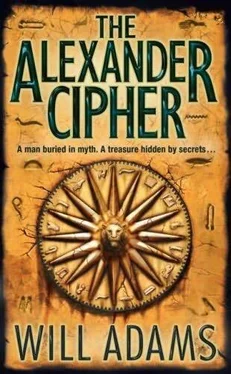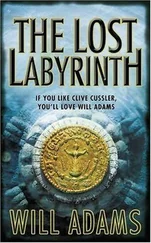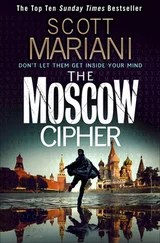Will Adams - The Alexander Cipher
Здесь есть возможность читать онлайн «Will Adams - The Alexander Cipher» — ознакомительный отрывок электронной книги совершенно бесплатно, а после прочтения отрывка купить полную версию. В некоторых случаях можно слушать аудио, скачать через торрент в формате fb2 и присутствует краткое содержание. Жанр: Прочие приключения, на английском языке. Описание произведения, (предисловие) а так же отзывы посетителей доступны на портале библиотеки ЛибКат.
- Название:The Alexander Cipher
- Автор:
- Жанр:
- Год:неизвестен
- ISBN:нет данных
- Рейтинг книги:5 / 5. Голосов: 1
-
Избранное:Добавить в избранное
- Отзывы:
-
Ваша оценка:
- 100
- 1
- 2
- 3
- 4
- 5
The Alexander Cipher: краткое содержание, описание и аннотация
Предлагаем к чтению аннотацию, описание, краткое содержание или предисловие (зависит от того, что написал сам автор книги «The Alexander Cipher»). Если вы не нашли необходимую информацию о книге — напишите в комментариях, мы постараемся отыскать её.
The Alexander Cipher — читать онлайн ознакомительный отрывок
Ниже представлен текст книги, разбитый по страницам. Система сохранения места последней прочитанной страницы, позволяет с удобством читать онлайн бесплатно книгу «The Alexander Cipher», без необходимости каждый раз заново искать на чём Вы остановились. Поставьте закладку, и сможете в любой момент перейти на страницу, на которой закончили чтение.
Интервал:
Закладка:
The Jeep lurched as the man got off his hood. Footsteps scuffed and faded. Knox waited until there had been silence for a good couple of minutes, then climbed out and stripped off the tarpaulin. He had no time to waste. He had phone calls to make.
Despite staring furiously at the inscription, it still took Gaille several minutes to work out what was bothering her. But finally she got it. The bottom line of text was incomplete, and it was written left to right. Yet Demotic, like Arabic, had been written right to left.
The inscription in the Macedonian tomb had been in Greek. The few words of text in the antechamber paintings had been in Greek. The dedication on the architrave was in Greek. The shield bearers had been Greek. The gods they invoked had been Greek. This looked like Demotic, but it didn't read that way, not initially at least. And it seemed perverse to switch to Demotic just for the inscription. So maybe it had simply been too sensitive to be written in plain Greek. Maybe the writer had used the Demotic alphabet instead. Codes, after all, hadn't been unknown to the ancients. Alexander himself had used subterfuge to hide sensitive messages. The Admonitions of the Sons of Dawn, one of the Dead Sea Scrolls, had used code for particularly sensitive words. Valerius Probus had written an entire treatise on substitution ciphers. They had been simple things, because people had believed them unbreakable. But Gaille didn't.
She copied the inscription out onto a pad, checking for patterns as she did so. If this was a simple transliteration cipher, and the same word was encrypted more than once, then it would produce identical sequences every time. It wasn't long before she had her first strike, then a second and a third. The third looked particularly helpful: ten characters long, and appearing no fewer than four times. That surely had to be a single word-an important one, too. What could it signify? A person's name, perhaps. Mentally, she ran through all the names they had come across in the upper chamber. Akylos, too short. Likewise Kelonymus and Apelles, Bilip and Timoleum. She had a little surge of excitement when she thought to try Alexander, but that fell short, too. Her spirits sank again. She stood up and walked in brisk circuits around the small room, sensing she was missing something, scowling in an almost physical effort to impel her mind to the answer.
When finally it came, her cheeks flushed and she looked around, worried that her schoolgirl error might have been observed. For "Alexander," the name by which the world knew him, was in fact a Latin name. To Greeks, he had been known as Alexandros. She sat back down and used the letters in "Alexandros" to begin a transposition alphabet, replacing the Demotic symbols with the matching Greek letters wherever they appeared throughout the text. That gave her enough to guess the word adjacent to the first Alexandros: Macedonia. With half the alphabet now broken, the rest swiftly followed.
Ancient Greek was her thing; she made the translation on her pad, so utterly absorbed in her task that she lost track of time and her surroundings until her name was suddenly called, bringing her back to the real world.
She looked up to see Ibrahim, Nicolas, Mansoor, and Elena standing in a semicircle, looking expectantly at her, as though someone had just asked her a question and they were waiting for her answer.
Ibrahim sighed and said, "I was explaining to Nicolas how difficult Demotic can be. We want as few people as possible to know about this, so we very much want you to work on it by yourself. How long do you think you'll need? One day? Two? A week?"
It had to be the most gratifying moment of Gaille's professional life. "Actually," she said airily, holding up her pad, "it's already done."
Chapter Twenty
Nessim was in his hotel room, discussing plans with Hosni, Ratib, and Sami. There was no great zest to their conversation, however. Knox had vanished off the radar, and nothing they tried had picked him up again.
It was late afternoon when Nessim's phone rang. It was Badr, his contact from the phone company, who had been waiting for Knox to use his cell phone. "He's turned it on," he said excitedly. "He's making a call."
"Who to?"
"No one-he's sending pictures to an e-mail account."
"Where?"
"Near the railway station."
"Stay on the line," said Nessim. "Tell me if he moves." Hosni, Ratib, and Sami had already risen to their feet. He nodded at them. "We've got a trace," he said. "Let's go."
"Well?"said Ibrahim excitedly. "Don't keep us in suspense."
Gaille nodded. She cleared her throat and began to read aloud: "I, Kelonymus, son of Hermias, brother of Akylos, builder, scribe, architect, sculptor, lover of knowledge, traveler in numerous lands, give homage to you, great gods, for allowing me to bring to this place below the earth these thirty-two shield bearers, heroes of the great victor, Alexander of Macedonia, son of Ammon. I now make good my pledge to bring together in one place the thirty-three who died carrying out the last wish of Alexander, that a tomb be built for him in sight of the place of his father. And to fulfill his wish, Akylos and these thirty-two built such a tomb and appointed it with goods fit for the son of Ammon."
Gaille hadn't properly registered the text until now-she'd been too busy translating it. But even as she read it out, she realized how explosive it was. She glanced up and saw on everyone's faces the same astonishment that she knew must be on her own.
"Go on," said Elena hungrily.
"And to fulfill his wish, they seized his body from the White Wall to take it through the red land of great dryness to the mouth of the place prepared below the earth. And near that place, Ptolemy, who is styled Savior, trapped these men so that they took their lives rather than be subjected to his torture. And so Ptolemy crucified them in vengeance and left them crucified for the carrion to feed on. Akylos and the thirty-two gave their lives to honor the wishes of Alexander, son of Ammon, in defiance of Ptolemy, son of nothing. I, Kelonymus, man of Macedonia, brother of Akylos, beseech you, great gods, to welcome these heroes into your kingdom as you welcomed Alexander."
She looked up again to indicate that she had finished. The looks of excitement had given way to a kind of stunned disbelief. No one spoke for a good five seconds.
It was Nicolas who finally broke the silence. "Does that…," he began hesitantly. "Does that mean what I think it means?"
"Yes," said Ibrahim. "I believe it does."
The moment his photographs were sent, Knox deleted the images from his cell phone, then turned it off altogether and roared away in his Jeep before Nessim had a chance to get to him. Just one more phone call, and he'd be in business. He parked near Pompey's Pillar, bought himself a ticket, and went inside. The site was a walled enclosure of about a hectare, surrounded by high-density housing. The pillar itself occupied pride of place on the small hillock at its center, but in fact the whole enclosed area was historic as the onetime site of the famous Temple of Serapis.
Knox had always felt a great fondness for Serapis, a benign and intelligent deity who had somehow fused Egyptian, Greek, and Asian religious myths into a single theology. According to one thesis, he was a Babylonian god; in fact, when Alexander had lain dying in Babylon, a delegation of his men went to the Temple of Serapis to ask whether Alexander should be brought to the temple or left where he was. Serapis replied that it would be better for him to be left where he was. The delegation obeyed, and Alexander died shortly afterward, that being the better thing. Other scholars, however, asserted that Serapis had its roots in the Black Sea city of Sinope, while still others claimed that Serapis was Egyptian, because Apis bulls had been sacrificed for centuries and buried in huge vaults known to the Greeks as the Sarapeion, a contraction of "Osiris-Apis" or "dead Apis bull."
Читать дальшеИнтервал:
Закладка:
Похожие книги на «The Alexander Cipher»
Представляем Вашему вниманию похожие книги на «The Alexander Cipher» списком для выбора. Мы отобрали схожую по названию и смыслу литературу в надежде предоставить читателям больше вариантов отыскать новые, интересные, ещё непрочитанные произведения.
Обсуждение, отзывы о книге «The Alexander Cipher» и просто собственные мнения читателей. Оставьте ваши комментарии, напишите, что Вы думаете о произведении, его смысле или главных героях. Укажите что конкретно понравилось, а что нет, и почему Вы так считаете.












